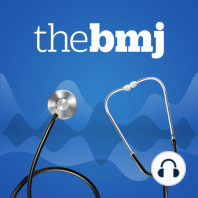21 min listen
Talk Evidence - political persuasion and mortality, too much medicine
FromThe BMJ Podcast
ratings:
Length:
41 minutes
Released:
Jun 17, 2022
Format:
Podcast episode
Description
In this week's episode, Helen Macdonald is joined by Joseph Ross, US research editor for The BMJ, and Juan Franco, editor of BMJ EBM.
They begin by discussing a review of obesity interventions in primary care, and Joe wonders if GPs are really the best people to tackle the issue.
https://www.bmj.com/content/377/bmj-2021-069719
Cervical screening in the UK now includes HPV testing, and they look at research which examines whether this could mean longer periods between screening tests.
https://www.bmj.com/content/377/bmj-2021-068776
They all enjoy a new State of the Art Review into Revascularization in stable coronary artery disease.
https://www.bmj.com/content/377/bmj-2021-067085
Juan and Joe look at a review into combinations of covid-19 vaccinations - and wonder whether we'll ever see more trials to fit into this meta-analysis.
https://www.bmj.com/content/377/bmj-2022-069989
Finally, they find out how your political persuasion has affected mortality in the US, with new research that links Republican and Democrat voters with differential changes in mortality.
https://www.bmj.com/content/377/bmj-2021-069308
They begin by discussing a review of obesity interventions in primary care, and Joe wonders if GPs are really the best people to tackle the issue.
https://www.bmj.com/content/377/bmj-2021-069719
Cervical screening in the UK now includes HPV testing, and they look at research which examines whether this could mean longer periods between screening tests.
https://www.bmj.com/content/377/bmj-2021-068776
They all enjoy a new State of the Art Review into Revascularization in stable coronary artery disease.
https://www.bmj.com/content/377/bmj-2021-067085
Juan and Joe look at a review into combinations of covid-19 vaccinations - and wonder whether we'll ever see more trials to fit into this meta-analysis.
https://www.bmj.com/content/377/bmj-2022-069989
Finally, they find out how your political persuasion has affected mortality in the US, with new research that links Republican and Democrat voters with differential changes in mortality.
https://www.bmj.com/content/377/bmj-2021-069308
Released:
Jun 17, 2022
Format:
Podcast episode
Titles in the series (100)
Dying at home: This week, we look at how to help patients have better deaths at home.BMJ assistant editor Sophie Cook talks to Emily Collis, a consultant in palliative medicine and the author of a recent clinical review about caring for dying patients in the commun... by The BMJ Podcast
